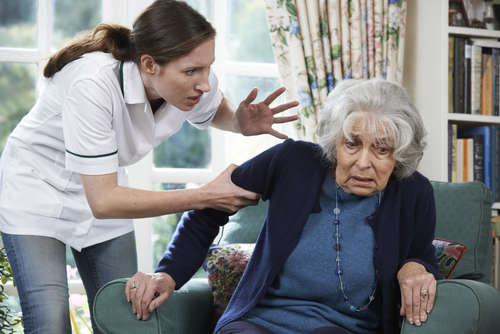 When you make the decision to move a loved one into an assisted living facility, you are entrusting that family member’s happiness and well-being to the staff members that work there. It is a bond of trust, and when that trust is violated through abuse or neglect, the impact can be devastating. However, many times, family members are unaware of the abuse that is happening, because the abused individual refuses to speak about it. Here are 6 signs to be on the lookout for that may indicate nursing home abuse or neglect.
When you make the decision to move a loved one into an assisted living facility, you are entrusting that family member’s happiness and well-being to the staff members that work there. It is a bond of trust, and when that trust is violated through abuse or neglect, the impact can be devastating. However, many times, family members are unaware of the abuse that is happening, because the abused individual refuses to speak about it. Here are 6 signs to be on the lookout for that may indicate nursing home abuse or neglect.
Change in Behavior or Personality
If you are visiting your loved one and notice that their behavior has drastically changed, this could be a sign of abuse. Often, abused individuals will become quieter and more withdrawn than before. They may also become more irritable and might lash out with minimal provocation. If you notice these changes occurring (and your loved one does not have a neurological disorder that might be causing these changes), then you should be on the lookout for other signs of abuse as well.
Physical Marks
Unexplained bruising or abrasions on your loved one are a clear sign that something is happening, and you need to figure out what that is right away. Don’t be afraid to question staff members outright regarding any injuries you see on your loved one. If you’re not satisfied with the explanation they offer, or if new injuries continue to appear, you should have your loved one moved to a new facility and consider litigation against the business.
Reluctance to Speak around Staff
Sometimes, an individual suffering from abuse in a nursing home won’t withdraw completely from conversation. They may continue to speak easily and act relaxed when you come to visit. However, if you notice them clamming up as soon as a staff member enters the room, this is a red flag that something is wrong. This indicates that your loved one fears the staff for some reason, and you should start asking questions about why that is the case.
Rapid Weight Loss
If your loved one seems to be thinning out quite quickly in the assisted living facility, this is a clear sign of abuse. Unless the individual is suffering from another medical condition that can cause rapid weight loss (in which case, the staff should be speaking with you and recommending treatments for the matter), your loved one should be maintaining a healthy weight. Sometimes, abusers in a nursing home will withhold food from residents as a form of punishment for undesirable behavior. So, if your loved one is losing weight, it’s time for you to start asking questions.
Extreme Lethargy
Assuming your loved one does not suffer from a medical condition that can cause this symptom, there is no reason for them to be extremely lethargic. While it may happen occasionally when you are visiting (due to a poor night’s sleep, a side effect of medication, etc.), if it is a regular occurrence, then it could be a warning sign of abuse. There have been instances of caregivers in nursing homes using medication to sedate residents to make them easier to care for. This is hazardous to the residents’ health, so if your loved one seems to be constantly groggy, this is a sure warning sign of abuse.
Unclean Living Conditions
Signs of abuse and neglect can be found in your loved one’s environment as well as in their behavior. Any time you visit, take a look around the facility and see how clean it is. If you have to schedule a visit to see your loved one, or if there are limited visiting hours, it can be harder to spot a poor living condition, as the staff will have time to make the facility more presentable. However, be on the lookout for bad smells, ample stains, unchanged bed linens, and filth in harder-to-clean areas like under rugs and furniture. These may indicate that the facility was only hastily straightened for your visit, and the general living conditions are much poorer.
What You Can Do about Abuse and Neglect
If you believe your loved one is being abused or neglected in a nursing home or other assisted living facility, your first course of action should be to remove them from the facility immediately. Then, contact an attorney who is experienced with such cases as soon as you can. We can help you to build a case against the facility to ensure that you and your loved one are compensated for what you’ve endured, and that that kind of abu